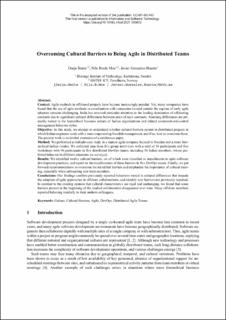| dc.contributor.author | Smite, Darja | |
| dc.contributor.author | Moe, Nils Brede | |
| dc.contributor.author | Gonzalez-Huerta, Javier | |
| dc.date.accessioned | 2022-05-13T12:25:37Z | |
| dc.date.available | 2022-05-13T12:25:37Z | |
| dc.date.created | 2021-06-20T00:17:13Z | |
| dc.date.issued | 2021 | |
| dc.identifier.citation | Information and Software Technology. 2021, 138, 106612. | en_US |
| dc.identifier.issn | 0950-5849 | |
| dc.identifier.uri | https://hdl.handle.net/11250/2995653 | |
| dc.description.abstract | Context: Agile methods in offshored projects have become increasingly popular. Yet, many companies have found that the use of agile methods in coordination with companies located outside the regions of early agile adopters remains challenging. India has received particular attention as the leading destination of offshoring contracts due to significant cultural differences between sides of such contracts. Alarming differences are primarily rooted in the hierarchical business culture of Indian organizations and related command-and-control management behavior styles.
Objective: In this study, we attempt to understand whether cultural barriers persist in distributed projects in which Indian engineers work with a more empowering Swedish management, and if so, how to overcome them. The present work is an invited extension of a conference paper.
Method: We performed a multiple-case study in a mature agile company located in Sweden and a more hierarchical Indian vendor. We collected data from five group interviews with a total of 34 participants and five workshops with 96 participants in five distributed DevOps teams, including 36 Indian members, whose preferred behavior in different situations we surveyed.
Results: We identified twelve cultural barriers, six of which were classified as impediments to agile software development practices, and report on the manifestation of these barriers in five DevOps teams. Finally, we put forward recommendations to overcome the identified barriers and emphasize the importance of cultural training, especially when onboarding new team members.
Conclusions: Our findings confirm previously reported behaviors rooted in cultural differences that impede the adoption of agile approaches in offshore collaborations, and identify new barriers not previously reported. In contrast to the existing opinion that cultural characteristics are rigid and unchanging, we found that some barriers present at the beginning of the studied collaboration disappeared over time. Many offshore members reported behaving similarly to their onshore colleagues. | en_US |
| dc.language.iso | eng | en_US |
| dc.publisher | Elsevier | en_US |
| dc.rights | Attribution-NonCommercial-NoDerivatives 4.0 Internasjonal | * |
| dc.rights.uri | http://creativecommons.org/licenses/by-nc-nd/4.0/deed.no | * |
| dc.subject | Culture | en_US |
| dc.subject | Cultural barriers | en_US |
| dc.subject | Agile | en_US |
| dc.subject | DevOps | en_US |
| dc.subject | Distributed agile teams | en_US |
| dc.title | Overcoming cultural barriers to being agile in distributed teams | en_US |
| dc.title.alternative | Overcoming cultural barriers to being agile in distributed teams | en_US |
| dc.type | Peer reviewed | en_US |
| dc.type | Journal article | en_US |
| dc.description.version | acceptedVersion | en_US |
| dc.source.volume | 138 | en_US |
| dc.source.journal | Information and Software Technology | en_US |
| dc.identifier.doi | 10.1016/j.infsof.2021.106612 | |
| dc.identifier.cristin | 1916997 | |
| dc.relation.project | Norges forskningsråd: 267704 | en_US |
| dc.source.articlenumber | 106612 | en_US |
| cristin.ispublished | true | |
| cristin.fulltext | original | |
| cristin.fulltext | postprint | |
| cristin.qualitycode | 2 | |

